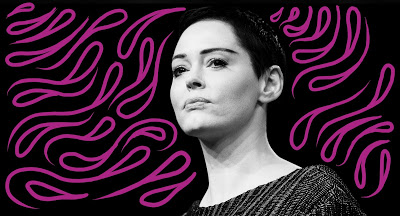‘Citizen Rose’ stars an imperfect victim — but Rose McGowan still deserves to be heard
 |
| Shanon Lee – Jan 28, 2018 |
Rose McGowan is a victim people love to hate. The actress and survivor-activist is vengeful, and she won’t play nice.
“I wish I had more middle fingers,” McGowan says in a trailer for “Citizen Rose,” a five-part documentary debuting Jan. 30 on E!. It follows the actress as she advocates for sexual assault survivors and features moments of McGowan with journalist Ronan Farrow, who helped break the Harvey Weinstein story in the New Yorker, and Tarana Burke, the original creator of the “Me Too” campaign.
The docu-series premiere coincides with the release of McGowan’s memoir, “Brave,” and she has been criticized for selfishly capitalizing off the momentum of the #MeToo movement.
McGowan hears the criticism, but she always bites back.
“FYI: Not turning #MeToo into a show,” she tweeted. “I have been shooting footage for my documentary for three years. … And I have been working on my whistleblowing and taking the motherf — king monster down for 20 years. Now do you get it?”
McGowan’s defiance makes others uneasy. When Hollywood actresses rallied, wearing black to the 75th Golden Globe Awards to protest sexual violence in the film industry, McGowan tweeted, “I despise your hypocrisy.” The tweet has since been deleted, but the sentiment remains in subsequent social media posts. She continues to malign stars she claims “happily worked for the Pig Monster,” her nickname for the man she says raped her, defamed film producer Harvey Weinstein.
After actor Ben Affleck denied knowing she was raped by Weinstein, McGowan tweeted in response, “YOU ALL KNEW.” She uses social media as a weapon, targeting celebs she describes as complicit. Her Twitter account was suspended last year for violating the social media company’s terms of service.
McGowan encourages her followers, Rose Army, to speak out against sexual violence. But, she is labeled a hypocrite for accepting a $100,000 court settlement from Weinstein in 1997 and signing a non-disclosure agreement that once secured her silence. (McGowan is selling her $1.9 million Hollywood Hills home to fight recent legal action taken by Weinstein.)
Her life continues to be chaotic. Accused of leaving behind a wallet containing traces of cocaine after disembarking a plane last January, McGowan was arrested for felony possession of a controlled substance. She is currently out on bond and faces a maximum of 10 years in prison if convicted. She maintains her innocence and claims she was framed because of her activism.
But the controversy surrounding McGowan only distracts from the truth. She can be promiscuous, use drugs, lash out, be an opportunist and still not deserve what happened to her. Dissecting her behavior shifts the focus from where it rightfully belongs — punishing the perpetrator.
McGowan’s story is bigger than Hollywood.
She is like so many survivors of sexual assault I know, tormented by the trauma they experienced and disheartened by the injustice they continue to witness all around them. They are fighting to overcome social stigma and mental instability while trying to regain some sense of normality. Some never do.
In the age of Trump’s presidency and the #MeToo movement, survivors are constantly retraumatized by stories of sexual violence in the media and struggling to cope.
They are figuring out where they fit in, navigating a new era where survivors are encouraged to talk about sexual assault after they concealed horrific secrets for years and sometimes decades. They are an intricate mix of bravery and perseverance, with elements of recklessness that threatens to sabotage their progress. Like anyone else, they try to make the best decisions and sometimes fall short because they are human.
Society attempts to quantify the validity of rape survivors feelings and dictate how long we are allowed to grieve our loss. They expect our recovery to grant us the ability to turn our pain into purpose. During our journey, we are pressured to be Oprah-like — likable, forgiving and a beacon of hope to other survivors.
McGowan is problematic because she is the antithesis of a “perfect victim.” She dispels the myth that recovering from sexual trauma is easy. She is bitter, she is messy, she will not shut up, and she will not go away. She will not minimize her pain to make you more comfortable.
There is no perfect way to heal from sexual violence, and “Citizen Rose” offers a perspective that deserves to be honored. Rape survivors are allowed to have flaws. Many are still processing pain and trying to figure it all out. Many are angry. Many are just like Rose McGowan.


